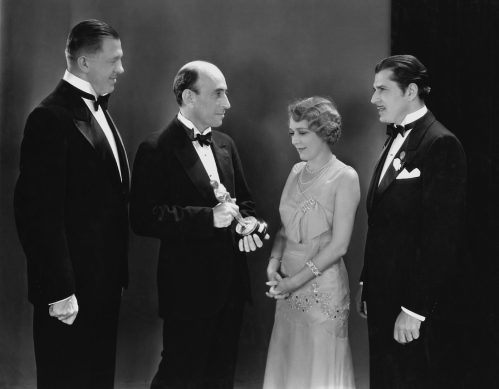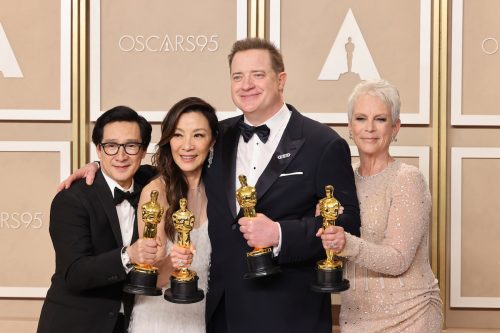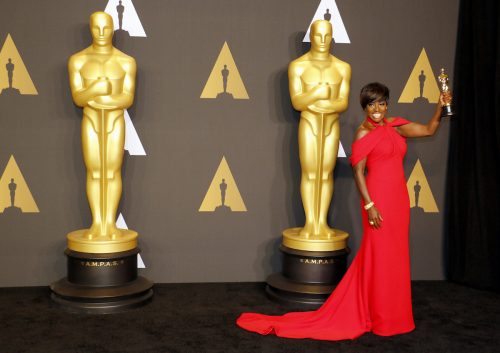Every year since 1929, the Academy of Motion Pictures Arts and Sciences (AMPAS) has handed out trophies honoring what members determine to be the best of the best of the film industry from the past year. The categories have changed over time, but for 95 years, the Academy has presented its winners with gold statuettes shaped like a man holding a sword standing on top of a film reel. These awards are known as Oscars, and that name has been part of this celebration of filmmaking almost as long as the ceremony itself has existed.
For decades now, the terms “Oscars” and “Academy Awards” have been used interchangeably. But, where did the nickname come from? If you look into Hollywood history, you’ll find that there are a few conflicting accounts as to how the “Academy Award of Merit” became the “Oscar,” as well as several different people taking credit for the change. Read on to find out more about the history of the awards show, the naming of Oscar, and more about this iconic trophy.
RELATED: 7 Oscar-Winning Movies That Are Offensive by Today’s Standards.
How did the Academy Awards start?

The Academy of Motion Picture Arts and Sciences was formed in May 1927 as a non-profit organization, according the Academy’s website. It originally consisted of 36 members working in the movie industry. According to the organization, its mission “is to recognize and uphold excellence in the motion picture arts and sciences, inspire imagination, and connect the world through the medium of motion pictures.”
During an early meeting of the group, they decided to give out awards each year to “honor outstanding moviemaking achievements and thereby encourage excellence in all facets of motion picture production.”
The first Academy Awards was held two years later on May 16, 1929 at The Hollywood Roosevelt Hotel. Awards were given out in 12 categories. Some of them remain today (ex. Best Picture, Best Actor, Best Actress, Best Cinematography) while other awards have changed or been retired (ex. Best Unique and Artistic Picture, Best Title Writing).
The first Academy Awards ceremony was not broadcast in any way, but the second one aired on the radio. The first televised Oscars came in 1953. Today, there are over 10,000 members of the Academy.
Academy Awards vs. Oscars


While there are various stories about how the name Oscar came to be, all the tales generally refer to the statue being named Oscar and the title later becoming a way to refer to the ceremony as a whole (ex. “The Oscars”). “The Academy Awards and “the Oscars” are used interchangeably and mean the same thing, just as “an Academy Award” and “an Oscar” both refer to the statuette.
The name Oscar first came about in the 1930s, according to AMPAS, and the organization began officially using it in 1939. The words “Academy Awards” and “Oscars” were trademarked in 1979, according to the Los Angeles Times, while the statue itself was trademarked four years earlier in 1975.
If you look at the Google search term history for both “Oscars” and “Academy Awards”—which spans back to 2004—”Oscars” is used more commonly by Google searchers than “Academy Awards.” This could speak to the word Oscars being used more often by the general public, but it also takes less time to type on a computer or phone. Naturally, both terms peak at the same time each year, around when the awards show takes place.
RELATED: 6 Old Hollywood Movies You Can’t Watch Anywhere Now.
What is the myth behind the name Oscar?
There are several stories behind how the name Oscar came into existence and who the award is named after. In a video from the Academy, Oscar historian Robert Osborne says, “There are three people that always claim they named it Oscar. The only thing that we’re sure about is that it happened around 1935.” These three people are reporter Sidney Skolsky, executive director of the Academy Margaret Herrick, and actor Bette Davis.
According to AMPAS, Skolsky was responsible for using the word Oscar in print for the first time in his gossip column in March 1934. According to Osborne, Skolsky “got very tired of writing about ‘the gold statue of the Academy'” and said he came up with the nickname based on a vaudeville joke in which the punchline included someone being called Oscar.
According to The Independent, Skolsky wrote in his 1975 book Don’t Get Me Wrong – I Love Hollywood, “It was my first Academy Awards night when I gave the gold statuette a name. I wasn’t trying to make it legitimate. The snobbery of that particular Academy Award annoyed me. I wanted to make the gold statuette human.” He said he wanted a nickname “that would erase [the Academy’s] phony dignity.” Variety reports, though, that researcher Waldemar Dalenogare Neto found that the word Oscar had actually been used in the press prior to Skolsky’s column.
Herrick was an early executive director for AMPAS. She claimed that she named the award after her uncle Oscar. According to Biography, the relative was named Oscar Pierce and was actually Herrick’s cousin, but she called him her uncle. Other staff members of AMPAS reportedly overheard what Herrick called the award Oscar and the name became widely used.
As for Bette—who won two Oscars herself—Osborne says she “claimed she named it Oscar because the rear end of Oscar reminded her of her husband when he got out of the shower.” This would have been Bette’s first husband, Harmon Oscar Nelson, to whom she was married from 1932 to 1938. But, as Biography reports, the name was in use prior to Bette calling the trophy “Oscar” after her first win in 1936, so it doesn’t seem that she was the real inventor.
Bruce Davis, the author of the 2022 book The Academy and the Award: The Coming of Age of Oscar and the Academy of Motion Picture Arts and Sciences, credits someone else entirely. According to the former AMPAS executive director, credit for the name Oscar “should almost certainly belong to” Eleanore Lilleberg, who was an office assistant at the Academy, as reported by Variety. The author wrote that “Oscar” started to “seep out into the Hollywood community between 1930 and 1933,” and that while the name was seen as degrading at first, “by 1939, the organization had decided that the nickname was an asset rather than an impropriety.”
Deadline reports that, according to Bruce, Lilleberg got the name from a Norwegian military veteran she knew, who always “stood straight and tall” like the Oscar statue.
What is an Oscar award worth?


An Oscar is a pretty hefty trophy. The statuettes are 13½ inches tall, weigh 8½ pounds, and are made out of solid bronze plated with 24-karat gold. And while you might think they’re be worth a lot based on these materials and the fact that they are a part of movie history—and could be especially valuable if they belong to a major movie star—a rule set by the Academy means this is not the case.
Academy rules state that “Award winners shall not sell or otherwise dispose of the Oscar statuette, nor permit it to be sold or disposed of by operation of law, without first offering to sell it to the Academy for the sum of $1.00.” The rule also applies to “the heirs and assigns of Academy Award winners who may acquire a statuette by gift or bequest.”
So, essentially, an Oscar is only “worth” $1. This is far less than what it cost to make one of the awards. According to WalletHub, they are actually worth around $400—historical significance not included.
And while winners aren’t allowed to sell their Oscars today, past Academy Awards have been sold and auctioned. As reported by Parade, Steven Spielberg bought several Oscars at auction—including both of Bette Davis’, one of which cost over $500K—and gifted them back to the Academy for preservation. The late Michael Jackson also bought an Oscar: the one producer David O. Selznick won for Best Picture for Gone With the Wind, for a whopping $1.5 million.
For more celebrity news delivered right to your inbox, sign up for our daily newsletter.
